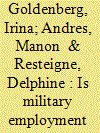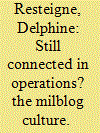|
|
|
Sort Order |
|
|
|
Items / Page
|
|
|
|
|
|
|
| Srl | Item |
| 1 |
ID:
146882


|
|
|
|
|
| Summary/Abstract |
Although military and civilian personnel work closely together in defense organizations, they are subject to different human resources practices and conditions of service. Assessments of military personnel along a range of job characteristics are examined to identify areas in which they assess themselves as “better or worse off” than their civilian counterparts, and how these comparisons relate to perceptions of fairness using data from Belgium, Canada, and the Netherlands. Military personnel reported meaningfulness/support aspects (e.g., meaningful work) as similar for military and civilian personnel, indicated that negative impacts (e.g., risk of injury) were greater for military, and perceived variability in instrumental benefits (e.g., pay, advancement). Upward social comparison (i.e., seeing oneself as worse off) was related to lower perceived fairness, whereas downward social comparison was related to higher perceived fairness. This research informs mechanisms for promoting perceptions of fairness and enhancing military–civilian personnel relations in defense establishments.
|
|
|
|
|
|
|
|
|
|
|
|
|
|
|
|
| 2 |
ID:
085370


|
|
|
|
|
| Publication |
2009.
|
| Summary/Abstract |
In this article, the authors aim to apply well-known concepts of managerial work to the military. The concepts and methods used are derived from Henri Mintzberg, who paved the way in discovering the "nature of managerial work." The data are based on closely observing two commanding officers at Kabul International Airport, operated by the International Security Assistance Force. Those managers play different managerial roles, and the ability to develop three types of roles-informational, interpersonal, or decisional- depends on their hierarchical level, their own functional area, and the complex environment of the military compound. Compared to conventional managers, military managers during multinational deployments have to cope with specific features such as the importance of language and communication skills (information roles), boredom among the workforce (interpersonal roles), as well as suddenly occurring emergencies and multiple ("political") authority lines inside and outside the mission area (decisional roles).
|
|
|
|
|
|
|
|
|
|
|
|
|
|
|
|
| 3 |
ID:
100020


|
|
|
|
|
| Publication |
2010.
|
| Summary/Abstract |
With the development of new information and communication technologies, military organizations are confronted with a proliferation of new informal channels used by soldiers, such as military blogs (or 'milblogs'). These consist of small websites created by defence personnel around military topics. Because they have the potential to reach a large audience, milblogs have become influential and, sometimes, controversial, pushing military organizations to be more open but also to try to control them. This article first describes the new forms of communication in the military, both at the institutional and at the individual level. Next it discusses the use of milblogs among Belgian soldiers in the field and the wider role played by the internet in operations, both as an information tool and a way to break the routine of the mission. Finally it examines how these information flows, while offering more diverse perspectives, also compete with official bureaucratic channels and elements of military culture.
|
|
|
|
|
|
|
|
|
|
|
|
|
|
|
|
|
|
|
|
|